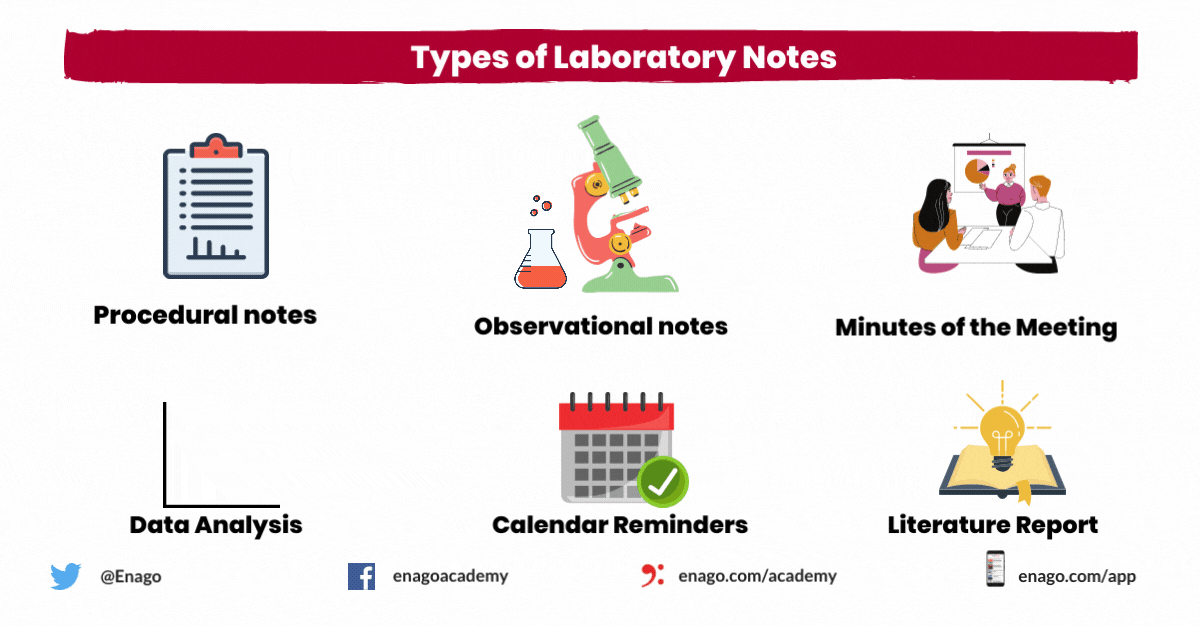9 Great Tools to Maintain Lab Notebook for Researchers

You have scheduled a real time PCR to determine your primer efficiency. After thorough planning, you were able to successfully finish the experiment and get the Ct value. As you sit to write the experiment in your journal, you struggle to understand the notes you made while carrying out the experiment. You in fact, did not even write down the dilutions! Without writing the correct requirements and methodology, the results from the experiment aren’t reliable. Then you remember, how your PI had mentioned to note everything you perform in the laboratory as and when possible!
Why to Maintain and Organize Lab Notebook?
Lab Notebook is one of the most useful resources for a researcher. Although a mundane job, writing laboratory notes helps researchers gather information and track all the experiments, their results, and failures that are further used for optimization of the experiments. Despite its imperativeness, no researcher ever calls it an interesting job as it involves a lot of writing. This process is like journal completion only much more complicated, as the researcher has to mention each and every detail of the experiment they performed.
Following reasons make lab notes a reliable resource for researchers:
- Maintaining diligent records help researchers understand their results. There are times when the written results don’t make sense because the researchers analyze it after a few days of performing the experiments.
- Detailed note taking helps organize the research work. Furthermore, it helps picking up the work from where it was left.
- Good lab notebook provides written evidence, increase transparency, and lets researchers undergo data analysis ethically.
Researchers who decide to write and publish a paper after a few months or years after performing the experiments rely on the research note, as they ensure reproducibility, which is essential in paper publishing. Furthermore, details from lab notebook help researchers write the procedures and results with accuracy.
Types of Laboratory Notes
Type of information a researcher documents in the journal, defines the type of laboratory notes. In a research project, research notes are of various forms like – literature report, experiment planning, timelines of experiments, raw data, requirements, procedures, statistical data, flowcharts, observational images and references, etc. The challenge lies in keeping a track of all the information documented based on these types. But, this task is not as challenging as it initially looks, because it takes discipline to maintain and organize various types of notes with good lab practices and healthy habit of notetaking.
Digital Lab Notebook – Simplifies or Complicates a Researcher’s Life?
Maintaining lab notebook is a discipline. Every researcher must inculcate the habit of taking notes from the experiments they have performed to the events they have planned for their project. However, Students in their early days of career are comfortable with taking notes because they are a mandate to acquire grades. However, with time and increasing responsibilities of the project, students/researchers tend to miss out on taking notes regularly.
As mentioned earlier, making research notes can sometimes take longer than the actual duration of the experiment!
new lucrative applications are used to mitigate the trouble of spending long hours in making lab notebook.
Earlier, documenting data was a time consuming process. Digital applications or electronic lab notebooks improve time management of documenting project data. Unlike the pen and paper notes, digital lab notebooks are easily accessible and searchable. Retrieving data from the pile of raw data is an easy task in digital documentation. Moreover, there are applications which can organize data and help researchers set reminders for further planned experiments. There are apps that give complete overview of the project work and how to plan the project tasks in advance.
There are people who prefer writing their lab notes on paper over using the digital platform. Although a personalized exercise, writing on paper is a time consuming process. Over time research scholars who prefer hand written notes may have to adapt to electronic lab notebook and applications. There is no However, with growing pace of research and the race to publish first, it is better to incorporate smarter tools to work with instead of perishing with knowledge worth publishing!
9 Great Tools to maintain Lab Notebook
1. Labguru
Labguru web service and mobile application lets researchers plan, record, assess, and share information the entire day. Researchers can photograph and share experimental results, use whiteboard drawings, access conference posters, or visual notes for related steps in an experiment.
2. Notion
Notion organizes documents, databases, audio-visual content, notes, meetings, and schedules.
3. CloningBench
This application is specific for the biology field of research. CloningBench helps and guides researchers through important decisions in cloning research. It includes features like molar quantities calculator, gene size estimator, bacterial growth timer, etc.
4. PubChase
PubChase gives latest updates in biomedical publication. Furthermore, researchers can search through literature database and save interesting articles to read later.
5. Cell Imaging HD
This app allows researchers to find and visualize reagents, fluorescent dyes, and protocols. Furthermore, Cell Imaging HD is designed for research related to cell biology and major microscope systems.
6. PCalc
It is used for calculations and unit conversions which are extensively used in designing various quantitative experiments. PCalc is one of the highest rated scientific apps.
7. Hivebench
Hivebench is a substitute for paper notebooks and specifically designed for lab research. Researchers can be more detailed, organized, and precise in their research project.
8. BioGene
It is a quick reference tool. It looks up the genes used quite often in medical research. Scientists can get complete details about the genes appearing in relevant publication.
9. ResearchKit
It is an open source platform, allowing scientists to build customized application for their studies. This app allows to gather participant data. Researchers can look through the app and appoint suitable individuals for varied research roles. Moreover, this app works like LinkedIn, but specific to the research field.
Have you used any of the tools mentioned above? Did you like these tools and their interface? Tell us if you have used some other innovative tools and share with us your experience of using them. If you find this information interesting and want to explore the hacks for becoming a productive and efficient researcher, do write to us or leave a comment below!










